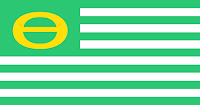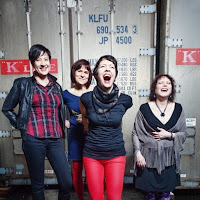In 2017, I was asked to participate in the second round of Troublemakers, a program by community development group Reel Youth that matches young, queer filmmakers with queer community elders. It was the second year of the project, thus Troublemakers 2.0.
Most people seem to think I'm much less introverted and neurodiverse than I am. I have tried hard to fit into the normal world, and I think I give the impression that I'm better at it than is really the case. This is why people invite me to things like Troublemakers.
I said yes because I thought it was a great project and an honour to be asked to participate. But sometimes you should say no to things even if you disappoint the person asking, and that time I should have followed my gut.
It was a difficult weekend for me. I was uncomfortable going in. I felt out of place. Group exercises felt awkward and sometimes even painful. I met many wonderful people that weekend, but I was just in the wrong frame of mind for a big group thing. I felt bad because I had put myself in the situation, and then bad again because I hate being a drag.
At the same time, the very young filmmaker I was assigned to work with had issues of his own. He wanted to make the interview entirely spontaneous. We tried that on the first day of shooting, but it left us with pretty much no usable footage. So on the final day, one of the mentors helped fix the questions, and then kept us on script while helping the filmmaker stay focused and positive. I could have prompted less generic questions, but I did not. I just wanted to cooperate with the process. I wanted the filmmaker to do well too.
It worked, pretty much. The film came out well enough. It's well shot and edited. I recognize the person speaking. The music stuff was good. I also talked about sex, which was about as close to the edge as we got. The rest is trivial. I hadn't let them know in advance about any other troublemaking, and the questions didn't go in that direction, so it's a pretty untroubled film.
I could have re-upped and participated in Troublemakers 5.0, but I knew it would be no better a fit for me now than it was four years ago. Instead, I'll write about the trouble I made that I should have talked about when I had the opportunity.
I went to a private Catholic school run by an order of teaching sisters. I was smart and had unrecognized ADHD, so I was often bored and in need of stimulation. I had a bad tendency to latch onto troublemakers and then join in with them. All the way through grade eight, I had excellent academic marks and terrible conduct marks.
None of that was "good trouble," just acting out. My troublemaking improved in high school. I became an environmentalist when that was still considered extreme. I wore a black armband on the first anniversary of the Kent State massacre. My friend and I were hauled into the principal's office for creating and distributing an unauthorized publication. I used my position as yearbook editor to make a political statement in the opening thematic section. As class valedictorian, I made a speech at graduation condemning the widening war in Vietnam, and I urged my fellow newly enfranchised 18-year-olds to vote for change.
At university I participated in antiwar protests. There was a big one in the autumn of 1972 in front of an armory where a Nixon fund-raising dinner was going on. We were run off by police after someone set fire to a car.
I had a folk music show on campus radio, and I aired a whole lot of controversial stuff during my four years at the mic, staying just this side of having the Jesuits come down on my musical selections.
In 1975 I was part of the Campaign for Economic Democracy, which Jeremy Rifkin led before he went off the deep end. We staged an all-night concert and protest at Concord Bridge, where President Jerry Ford made a speech commemorating the 200th anniversary of the start of the Revolutionary War (we did not succeed in interrupting the festivities).
After university, I got involved with the Clamshell Alliance. I was part of a huge protest at the Seabrook, New Hampshire nuclear power station. I was less afraid of meltdowns than I was concerned about the disposal of nuclear waste.
When I started making original music in the 1980s, it was raw and sharp and in yer face. I wrote anti-Reagan diatribes. I railed against the shallowness of modern life and the siren song of consumerism and wealth disparities. I had been brought up with strong ideals. They got pretty smashed up in 1968 and the years following, but I never lost them.
I shifted from music to acting in the late 1980s into the 90s. I was not making a lot of trouble then, other than for myself. I moved to Vancouver in 1994. I spent many years working, saving up to buy a house, and living through shit like 9/11. I made no appreciable trouble for many years.
I started to break out of that in 2006, the year I volunteered for a queer help line at Qmunity (then called The Centre). I even helped train new volunteers. In 2009, I volunteered at the first Girls Rock Camp Vancouver. At the time, it was still pretty subversive to help girls to make their own music and play together in bands, and this was an organization that was mostly run by queer women. I did GRCV for its first two years. I then helped to run Ladies Rock Camp so we could subvert the grown-ups too, and finally went back to GRVC for one more year.
Thanks to Girls and Ladies rock camps, I connected with local musicians, local women, and local queer women. In 2012, my bass-playing spouse and I formed Lisa's Hotcakes with two other rock camp alumnae. Hotcakes wasn't exactly a subversive band, but it goes against the norm to have older women making their own music together. And we were three-quarters queer.
In 2014, after Hotcakes was done, I became a charter member of Femme City Choir, a group of queer femmes, all of whom were younger than me, usually much younger. While having fun singing, I got steeped in queer, activist Millennial thinking. I learned a lot from them, and when I didn't agree with them, I learned a lot on my own. They prompted me to re-evaluate just how progressive I was and where I could do better. My time in FCC was not always easy, but I think it was crucial to the way I think today.
I feel as though I've regained my youthful fervor for change, with a lifetime's-worth of better ideas of what those changes should be. I joined the BC Greens, not exactly the establishment party, and volunteered in the two most recent provincial elections. I helped make New West Pride the most accessible Pride festival around, and then worked to keep reducing and eliminating barriers.
The election of D. Trump as president of the United States certainly focused my thinking. He was much more alarming than Nixon or Reagan or even Dubya. My long-time anti-fascism became popular again. The non-racism I was brought up with became anti-racism. The feminism I had never lost became more important than ever.
Not all old people become conservative. I support land back to Indigenous peoples. I want radical, effective action to mitigate global heating. I want white supremacism to die with a stake through its heart. I'm not as energetic as I was when I was younger, but I'm still ready to make trouble to make change.



